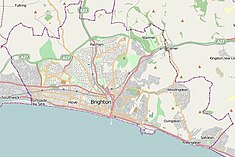| Preston Manor | |
|---|---|
 Main (north) façade of Preston Manor, looking south | |
| Location | Preston Drove, Preston Village, Brighton and Hove BN1 6SD, United Kingdom |
| Coordinates | 50°50′33″N 0°09′00″W / 50.8425°N 0.1501°W |
| Founded | 13th century |
| Built | 1250 |
| Built for | Lord of the manor of Preston |
| Rebuilt | 1738 |
| Restored | 1905 |
| Restored by | Charles Stanley Peach |
| Architect | Thomas Western |
| Architectural style(s) | Palladian/Georgian |
| Visitors | 8,000 (in 2012) |
| Governing body | Brighton & Hove City Council |
Listed Building – Grade II* | |
| Official name | Preston Manor and attached railings |
| Designated | 13 October 1952 |
| Reference no. | 1380750 |
Location within Brighton and Hove | |
Preston Manor is the former manor house of the ancient Sussex village of Preston, now part of the coastal city of Brighton and Hove, England. The present building dates mostly from 1738, when Lord of the manor Thomas Western rebuilt the original 13th-century structure (part of which remains inside), and 1905 when Charles Stanley Peach's renovation and enlargement gave the house its current appearance. The manor house passed through several owners, including the Stanfords—reputedly the richest family in Sussex[1]—after several centuries of ownership by the Diocese of Chichester and a period in which it was Crown property.
Since 1932, when the Stanford family bequeathed the building to Brighton Corporation, Preston Manor has been a museum and exhibition venue evoking upper-class life during the Edwardian era. A walled garden, designated as being of historic interest, has old flint walls, a ruined wellhouse and a pet graveyard, among other features. The manor house is reputed to be one of the most haunted buildings in Britain: it has been the subject of ghost tours and television programmes, and a wide range of ghostly sightings have been alleged over a long time period. English Heritage has listed the house at Grade II* for its architectural and historical importance; some other structures in the garden are listed at the lower Grade II.
- ^ "Preston Manor and Brighton". Brighton & Hove City Council. 2010. Archived from the original on 26 October 2010. Retrieved 3 October 2010.
